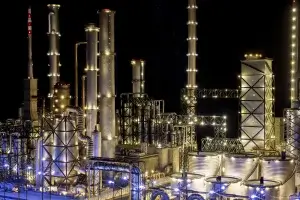Oct 24 2024
Screening | Energies: A Moving Image Convening at Anthology Film Archives
THURS | 7PM

This event will be held at Anthology Film Archives (32 2nd Ave, New York, NY, 10003). Tickets are available for purchase here.
On the occasion of the Energies exhibition, this film program reflects on the exhibition’s concern with addressing ecological affordances and effects, social formations, and political arrangements attached to energy past and present. Presenting a diversity of aesthetic approaches and historical positions, the films explore the politics of energy production in various global contexts and consider community organizing responses to socially inequitable, extractivist infrastructures.
Rosa Barba
They Shine, 2007
4 minutes, 35 mm, color, optical sound
Set in the Californian Mojave Desert, They Shine intertwines scenes of moving solar panels performing a refined choreography with voices of people from the local community who express their thoughts about the future and talk about the images evoked by these machines.
Nina Canell and Robin Watkins
Energy Budget, 2024
7 minutes 47 seconds, video
Energy Budget highlights the use of female ostrich feathers in the creation of dust-free car manufacturing environments. Showing a car on a slowed-down conveyor belt, the video explores the circulation of material agency and its energetics.
Oleksiy Radynski
Landslide, 2016
29 minutes, video
Set in central Kyiv, in a space that has suffered a series of landslides, a secretive graffiti team, a group of tech geeks, and an avant-garde gay theater that fled the war in Luhansk all struggle to create a place where they can coexist outside the pressure of dysfunctional social structures.
Monira Al Qadiri
Crude Eye, 2022
10 minutes, video
This dreamlike film hearkens back to the artist’s childhood memories, fusing eerie, slow views of a reconstructed miniature refinery with lines from poems about city lights and industrial landscapes.
Carolina Caycedo
A Gente Rio (We River), 2016
29 minutes, video
A Gente Rio (We River) addresses the socio-environmental violence surrounding dams as a source of hydroelectric power in Brazil, and the people’s resistance movements that have arisen as a result.
Allora & Calzadilla
The Night We Became People Again, 2017
15 minutes, video
Based on the eponymous short story by José Luis González, this film explores the proximity of nature and technology. Sunlight animates abandoned industrial sites and a cave in Puerto Rico’s Guayanilla-Peñuelas region, alternately illuminating machine remnants, insects, and dust.
Rosa Barba was born in Italy. The artist currently lives and works in Berlin. She studied at the Academy of Media Arts Cologne followed by a fellowship at the Rijksakademie van Beeldende Kunsten, Amsterdam; and has completed her PhD with the title “On the Anarchic Organization of Cinematic Spaces: Evoking Spaces beyond Cinema” at the Malmö Faculty of Fine and Performing Arts, Lund University in 2018. Barba merges films, sculptures, installations, live-performances, text pieces, and publications that are grounded in the material and conceptual qualities of cinema.
Nina Canell (born Växjö, Sweden, 1979, lives in Berlin) and Robin Watkins (born Stockholm, Sweden, 1980, lives in Berlin) are long-term collaborators. Their work foregrounds process and synergy, radically questioning material hierarchies and histories. Considering the transitory overlaps between minerals, animals, energies and technologies, their practice is committed to duration and circulation as fundamental sculptural tools.
Oleksiy Radynski is a filmmaker based in Kyiv, Ukraine. He was born in 1984 and raised in the ruins of a documentary film studio in Kyiv. After studying film theory at Kyiv-Mohyla Academy, he took part in several film education experiments including Home Workspace Program (Ashkal Alwan, Beirut) and Labor in a Single Shot by Harun Farocki and Antje Ehmann. As an essayist he has contributed to a number of publications including Proxy Politics: Power and Subversion in a Networked Age(Archive Books, 2017), Art and Theory of Post-1989 Central and East Europe: A Critical Anthology (MoMA, 2018), and e-flux journal.
Monira Al Qadiri (b. 1983) is a Kuwaiti visual artist born in Senegal and educated in Japan. Spanning sculpture, installation, film and performance, Al Qadiri’s multifaceted practice is mainly based on research into the cultural histories of the Gulf region. Her interpretation of the Gulf’s so-called “petro-culture” is manifested through speculative scenarios that take inspiration from science fiction, autobiography, traditional practices and pop culture, resulting in uncanny and covertly subversive works. She is currently based in Berlin.
Carolina Caycedo (1978) is London-born Colombian multidisciplinary artist known for her performances, video, artist’s books, sculptures and installations that examine environmental and social issues. She lives and works in Los Angeles. She participates in movements of territorial resistance, solidarity economies, and housing as a human right. Her work contributes to the construction of environmental historical memory, as a fundamental element for non-repetition of violence against human and non-human entities. She is a member of the Los Angeles Tenants Union and the Rios Vivos Colombia Social Movement.
Through a complex research-oriented practice, Allora & Calzadilla critically address the entanglements between history, ecology, and geopolitics using a multiplicity of artistic media that include performance, sculpture, sound, video, photography and painting. Allora and Calzadilla live and work in San Juan, Puerto Rico. Jennifer Allora (b. 1974) received a BA from the University of Richmond in Virginia (1996), attended the Whitney Independent Study Program (1998) and received an MS from the Massachusetts Institute of Technology (2003); Guillermo Calzadilla (b. 1971, Cuba) received a BFA from Escuela de Artes Plásticas, San Juan, Puerto Rico (1996) and an MFA from Bard College (2001).
The Energies Symposium is made possible in part through support from the Terra Foundation for American Art.
Image: Monira Al Qadiri, Crude Eye, 2022. Single-channel video, sound. 10 min.
